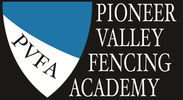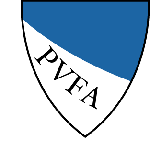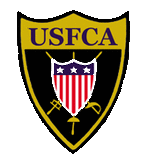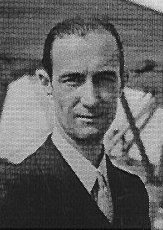
Coaching Clinics, Training, and Coaching Certification
The noble privilege of the Fencing Master is to defend and enhance the prestige, passion and poetry of the sword, and instill them into the heart and mind of the pupil. While he must be able to treat adequately the spiritual side of the art, his aim and toil is to demonstrate the architectural beauty of the science and the harmonious simplicity of its laws. Only by complete devotion to his profession will he accomplish his duty – to help fencing retain and expand its honored place among the more worth-while activities of mankind.
-Aldo Nadi
The noble privilege of the Fencing Master is to defend and enhance the prestige, passion and poetry of the sword, and instill them into the heart and mind of the pupil. While he must be able to treat adequately the spiritual side of the art, his aim and toil is to demonstrate the architectural beauty of the science and the harmonious simplicity of its laws. Only by complete devotion to his profession will he accomplish his duty – to help fencing retain and expand its honored place among the more worth-while activities of mankind.
-Aldo Nadi
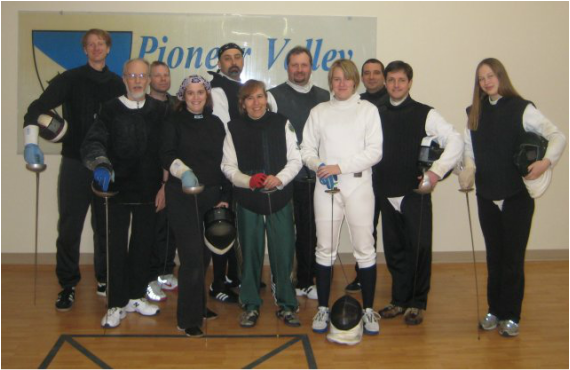
The Assistant Moniteur Certification for PVFA Fencers: Teenage fencers can train for certification as USFCA Assistant Moniteurs at PVFA in foil, epee, or saber. The ideal candidate must be a PVFA member and will have at least two years of fencing experience, a record of success in competition, excellent organizational skills, be patient and good with younger children, an aptitude for coaching, and a willingness to put in the extra effort. Students will be required to help teach the Youth class, study written materials, pass a written examination, and pass a practical examination for certification. The whole process usually takes about a year. The certification looks good on college applications and many of the students that we've certified have later been hired (once they are at least 18) by PVFA to help teach our summer classes. See the USFCA website for details about the Assistant Moniteur certification process.
Coaching Education and Certification for Non-PVFA Coaches:
Are you a fencer who would like to become a coach? Are you already teaching classes or giving lessons, but would like to improve your coaching skills? PVFA offers coaching training at our club and around the New England area.
If you are close to PVFA and would like to become a fencing coach or improve your coaching skills, contact us and we can help. Depending on your needs, we can arrange anything from a few coaching lessons to long term training.
USFCA Clinics in New England:
Paul Sise (far left) and John Krauss (center) at the Prevot level clinic held at PVFA in April 2012.
Fencing Master Paul Sise co-teaches clinics with John Krauss of the Down East School of Fencing in Maine. Clinics are usually offered each spring and fall in and are advertised on Askfred. These are excellent opportunities to receive high quality coaching education in New England, especially for those coaches who are not associated with the large clubs in the Boston area. See our clinic testimonial page for what others have said about previous clinics.
The practical examination for USFCA certification as a Moniteur is available from Paul and John at these clinics for USFCA members who have already passed the written exam.
Hosting the Clinic: There are benefits to being the club that hosts the clinic. As the host club, you get to help determine the date of the clinic as well as the material that will be presented. Also, you and your coaches will not have to travel far or stay in a hotel, which makes it more convenient and less expensive for you. If you would like to host a clinic please contact Paul Sise or John Krauss. See the USFCA website for details about the Moniteur certification process.
Previous Clinics were held for:
The Down East School of Fencing in Skowhegan, ME
Pioneer Valley Fencing Academy in Easthampton, MA
Vermont Fencing Alliance in Middlebury, VT
ICONN Fencing Club in Wallingford, CT
Candlewood Fencing Center in Danbury, CT
The Academies of Fencing, Baltimore Maryland
Concord Fencing Club in Concord, NH
Fairfield Fencing Academy, Fairfield CT
USFCA, an online series of lectures and discussion
Rogue Fencing Academy, Woodbridge, CT
Upcoming Clinics:
See the USFCA's website for a list of upcoming coaching clinics.
Clinic Topics:
The following topics are available in our clinics. Generally, a two day clinic will include at most six to eight of these topics, as well as time set aside for the clinic attendees to practice the material and receive feedback from the instructors.
Basic Armoring
The Business of Fencing (tips for running profitable club)
Safety and Professionalism
Risk Management
Sports Psychology
Coaching Children
Footwork
Teaching Methodology
Teaching group warm up activities, stretching, and games
Basic cueing techniques in all three weapons
Right of Way
Specific Fencing Techniques
Group lesson construction (methods of teaching drills to groups)
Technical and Tactical individual lessons in foil, epee, and/or saber
Moving from coach controlled to student controlled lessons
Lesson formats required in the Prevot and Master level USFCA exams
Coaching Education and Certification for Non-PVFA Coaches:
Are you a fencer who would like to become a coach? Are you already teaching classes or giving lessons, but would like to improve your coaching skills? PVFA offers coaching training at our club and around the New England area.
If you are close to PVFA and would like to become a fencing coach or improve your coaching skills, contact us and we can help. Depending on your needs, we can arrange anything from a few coaching lessons to long term training.
USFCA Clinics in New England:
Paul Sise (far left) and John Krauss (center) at the Prevot level clinic held at PVFA in April 2012.
Fencing Master Paul Sise co-teaches clinics with John Krauss of the Down East School of Fencing in Maine. Clinics are usually offered each spring and fall in and are advertised on Askfred. These are excellent opportunities to receive high quality coaching education in New England, especially for those coaches who are not associated with the large clubs in the Boston area. See our clinic testimonial page for what others have said about previous clinics.
The practical examination for USFCA certification as a Moniteur is available from Paul and John at these clinics for USFCA members who have already passed the written exam.
Hosting the Clinic: There are benefits to being the club that hosts the clinic. As the host club, you get to help determine the date of the clinic as well as the material that will be presented. Also, you and your coaches will not have to travel far or stay in a hotel, which makes it more convenient and less expensive for you. If you would like to host a clinic please contact Paul Sise or John Krauss. See the USFCA website for details about the Moniteur certification process.
Previous Clinics were held for:
The Down East School of Fencing in Skowhegan, ME
Pioneer Valley Fencing Academy in Easthampton, MA
Vermont Fencing Alliance in Middlebury, VT
ICONN Fencing Club in Wallingford, CT
Candlewood Fencing Center in Danbury, CT
The Academies of Fencing, Baltimore Maryland
Concord Fencing Club in Concord, NH
Fairfield Fencing Academy, Fairfield CT
USFCA, an online series of lectures and discussion
Rogue Fencing Academy, Woodbridge, CT
Upcoming Clinics:
See the USFCA's website for a list of upcoming coaching clinics.
Clinic Topics:
The following topics are available in our clinics. Generally, a two day clinic will include at most six to eight of these topics, as well as time set aside for the clinic attendees to practice the material and receive feedback from the instructors.
Basic Armoring
The Business of Fencing (tips for running profitable club)
Safety and Professionalism
Risk Management
Sports Psychology
Coaching Children
Footwork
Teaching Methodology
Teaching group warm up activities, stretching, and games
Basic cueing techniques in all three weapons
Right of Way
Specific Fencing Techniques
Group lesson construction (methods of teaching drills to groups)
Technical and Tactical individual lessons in foil, epee, and/or saber
Moving from coach controlled to student controlled lessons
Lesson formats required in the Prevot and Master level USFCA exams
